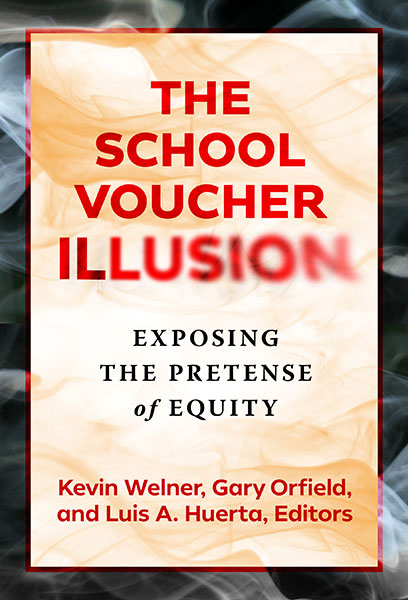Professors: Request an Exam Copy
Print copies available for US orders only. For orders outside the US, see our international distributors.
Edited by: Kevin Welner, Gary Orfield, Luis A. Huerta
Publication Date: April 28, 2023
Pages: 320

This authoritative book examines the long-standing campaign that resulted in today’s school voucher policies. Advocates of private school vouchers promulgated a vision of service to low-income families, students of color, and other marginalized student populations. Vouchers were sold as a way to advance civil rights. But as voucher policies grew in size and became an element of Republican orthodoxy, they evolved into subsidies for a broad swath of advantaged families, with minimal antidiscrimination protections. The approach also transmuted into forms like education savings account programs and vouchers funded through tax-credited donations. In this book, scholars and national experts untangle this complex story to show how law and policy have aligned to dramatically alter the likely future of American schooling. They offer recommendations for modifying current policies with the goal of capturing more of the originally stated vision of voucher programs—equitable access to quality schooling, protection of all students’ civil rights, and advancement of the wider societal goals of a democratic educational system.
Book Features:
Kevin Welner is a professor and director of the National Education Policy Center (NEPC) at the University of Colorado Boulder. Gary Orfield is Distinguished Research Professor of Education, Law, Political Science, and Urban Planning and co-director of the Civil Rights Project at the University of California, Los Angeles. Luis A. Huerta is an associate professor of education and public policy at Teachers College, Columbia University.
“The book, in summary, warns that state educational policy actions without adequate analysis can do lasting damage, adding insult to the injury of systemic inequality…Recommended.”
—CHOICE
“Walking your child to the neighborhood school? It’s become a dusty relic of the past—buried by radical reforms like awarding vouchers to parents, moving taxpayer dollars to private and religious schools. But which kids and families benefit when civic leaders liberalize parental choice and nurture differing forms of schooling? Do vouchers lift school quality and pull diverse children under one roof? This engaging volume—which clarifies the legal and policy logic of vouchers, then reveals empirical facts on the ground inside schools—may upset you. These expert authors uncover disturbing evidence on the politics and unequal results harming children and families, while pointing to ways that private vouchers, one day, could serve a broader common good.”
—Bruce Fuller, professor of education and public policy, University of California, Berkeley; author, When Schools Work
“For most of their history vouchers have been a fringe idea, favored only by free market ideologues willing to overlook the idea’s segregationist roots. Recently, however, vouchers have come roaring back to life, springing up in forms like tax-credit scholarships and ‘education savings accounts.’ Having carefully laid the legal and political groundwork, supporters have made significant inroads among conservative state legislatures. And having repackaged vouchers as a means for advancing racial equity and personal freedom, they have also begun to swing public opinion. Yet scratch beneath the surface and vouchers are the same treacherous ploy they always were. As this volume skillfully shows, they threaten particular harm to the least advantaged, for whom rights in an inclusive democracy will be replaced with ‘options’ in a market.”
—Jack Schneider, associate professor of education, UMass Lowell
Contents (Tentative)
1. Introduction: Voucher Expansion and the Abandonment of Equity
Kevin G. Welner, Gary Orfield, and Luis A. Huerta
2. The Segregationist Origins and Legacy of Today’s Private School Vouchers
Steve Suitts
3. Private School Vouchers: Legal Challenges and Civil Rights Protections
Kevin G. Welner and Preston C. Green
4. Voucher Expansion and the Threat to Students’ Educational and Civil Rights
Derek W. Black
5. Vouchers as a Mechanism for State-Sanctioned Private Discrimination
Julie F. Mead and Suzanne E. Eckes
6. Evolving Voucher Policies: Broadening Eligibility Through Rules & Schools
Luis A. Huerta and Steven Koutsavlis
7. Bait and Switch: How Voucher Advocates Shift Policy Objectives
Christopher Lubienski, T. Jameson Brewer, and Joel R. Malin
8. Educational Privatization in Congress From Reagan to Biden: An Ideology Unfulfilled
Elizabeth H. DeBray and Ann E. Blankenship-Knox
9. School Vouchers in Indiana: Policy Shifts and Their Implications for Economically Disadvantaged Families and Students of Color
Mark Berends, R. Joseph Waddington, and Megan Austin
10. A Voucher by Any Other Name: Empowerment Scholarship Accounts and the Future of School Choice
David R. Garcia and Makayla Steele
11. Washington, D.C. Voucher Program: Civil Rights Implications
Mary Levy
12. Private Sector Schools: Limited Scope & Stratification
Jongyeon Ee, Gary Orfield, and Jennifer Teitell
13. Conclusion: Can Vouchers Be Reshaped to Accomplish Their Initial Rhetorical Goals?
Kevin G. Welner, Gary Orfield, and Luis A. Huerta
Endnotes
Index
About the Editors and Authors
Professors: Request an Exam Copy
Print copies available for US orders only. For orders outside the US, see our international distributors.